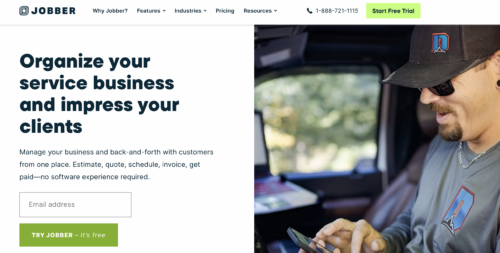Announcing Jobber’s $100m Series D: building a company for the long-term in an era of start-up hyper-growth
PortfolioOver the last few years, the start-up market has focused almost exclusively on hyper-growth, quick valuation increases, raising large amounts of capital, and trying to take companies public in a premature way (SPACs). Building a generational company systematically for the long-term has almost completely gone out of fashion.
In this context, it’s remarkable to see a company find success with a very different approach. Portfolio company Jobber is an operations management platform for small home service businesses (e.g. HVAC, lawn care, plumbing, residential cleaning, painting). The company was our first-ever Version One investment and has built incredible scale over the past 11 years: Jobber is now helping more than 200,000 home service professionals across 50 segments to deliver services to more than 27 million households in more than 60 countries. These jobs resulted in over $13 billion USD (!!!) in revenue in 2022 for Jobber’s customers.

As a result of this success, Jobber announced today a $100m Series D led by General Atlantic that will give the company the capital to continue building a generational company.
We can learn a few key lessons from how Jobber’s co-founders Sam Pillar and Forrest Zeisler have built the company over these years:
1/ You can build a large company anywhere.
Jobber got started in Edmonton, the provincial capital of Alberta, hardly a huge tech ecosystem. While the local talent pool was / is relatively small, Jobber found a way to hire all the local superstars to help get to PMF and the first few years of scaling the company. They then expanded to a second office location (Toronto) to tap into a broader talent pool before expanding to remote working options during the COVID years.
2/ The company was capital-constrained for the first 7-8 years of its existence.
Fundraising didn’t come easy…some prospective investors were put off by Jobber’s HQ location; others by the fact that Jobber was selling to SMBs and the presumably limited TAM. And while a lack of fundraising success was for sure very frustrating for Sam and Forrest at the time, it really forced the company to grow in the most capital-efficient way possible and build a highly efficient and focused organization.
3/ SMB markets can be huge.
While selling to SMBs has its challenges (e.g. higher churn than in the enterprise segment, less potential for MRR expansion, low ARPU), investors often underestimate the size of the underlying opportunity. SMB TAMs are huge, but the trick is to have an efficient GTM: you need to figure out ways to acquire your customers at costs that are reflecting unit economics that are very different from an enterprise sale.
4/ Relentless customer focus wins all the time.
Sam and Forrest have established a company culture that is centered around relentless customer focus. Understanding what your customers need and want is so crucial, but many companies lose that focus as they scale.
Eleven years into our investment we at Version One are more excited than ever about what lays ahead for Jobber. In fact, we’re so excited that we just doubled down on our investment by taking a stake in Jobber Series D through our most recent Opportunity Fund.